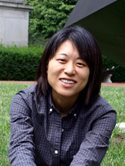Contents
ILETC is proud to support the following researchers and projects with Innovation in Language Education grants in the 2016-2017 academic year.
Microlearning Based Mobile Game for Mandarin Learning and Assessment
Brief Description
While Mandarin is considered a difficult language, it is also one of the most popular foreign languages in the world. Therefore, how to reduce the difficulty of learning, stimulate students’ learning motivation and keep their learning enthusiasm are major challenges to the language instructors. There is also a severe lack supplementary teaching materials to teach Mandarin. In addition, many CUNY students have part-time or full-time jobs, which prevent students from allocating adequate time to complete assignments out of the classroom. In order to tackle these challenges, we have designed a mobile game (Android and iOS) as supplementary learning tool. The mobile game adopts Microlearning concept, which deals with small learning topics and short-term learning activities. Students can play the games at any time in any location. The instructor can easily add any learning content as needed according to the textbook. Even most of the games in the app can be played out of the class; the instructor can trace how often the student used it and what the results are. In this project, we will pilot the game and conduct experiment in two sections of CHI 105, the Mandarin beginning course, taught by same instructor. To access the learning efficacy, we will evaluate students’ learning through four quizzes and two exams through the semester. The experiment results will be very useful for the game improvement. The game can be also applied to other foreign languages with little effort.
Recipients

Dr. Ling Luo is an Assistant Professor in Modern Languages Department of BMCC of CUNY. After received her PhD degree from Nanjing University in China, she came to New York and became a research fellow at East Asian Institute of Columbia University. Her interests include comparative cultures, Chinese cultural history and language acquisition using technologies. Her book “Modernization of Nanjing City” was collected by Harvard University library, Columbia University Library, Stanford University Library and Congress Library. Currently, Dr. Luo focuses on the research in Microlearning-based language acquisition and assessment.

Dr. Maria Enrico is currently Professor and Chair of the Modern Languages Department at Borough of Manhattan Community College/CUNY. Previously, she was cultural attaché at the Consulate General of the Republic of San Marino, executive director of The American University of Rome, and Director of the Modern Language Program at Mercy College in Dobbs Ferry, N.Y.

Dr. Hao Tang is an Assistant Professor of Computer Science at CUNY and a senior researcher at City College Visual Computing Research Laboratory. His research interests are in the fields of 3D computer vision, image understanding, and their applications in assistive technology and educational technology. He is the recipient of summer research award (2015) and the follow-on research award (2016), both from Department of Homeland Security. His research paper in transducing 3D content for the visually impaired was selected as a finalist for the best paper award in International Conference on Multimedia and Expo, one of the most prestigious conferences in Multimedia and Computer Vision.
Phonological Advances of Heritage Language Learners of Japanese and their Pedagogical Implications
Brief Description
This project examines phonological and syntactic advantages of heritage language (HL) speakers of Japanese over learners of Japanese as a second language (L2). The goal is to substantiate earlier findings on phonological advantages of HL learners over L2 learners of Spanish and Korean (Au et al., 2002; Oh, Knightly, & Au, 2003). These studies have found that HL learners benefit from a statistically significant advantage in phonological knowledge over L2 learners but are on par in syntactic (grammar) knowledge by looking at the acquisition of phonological and syntactic features in Japanese by HL and L2 learners, including the production of moraic nasal sound and phonemic long vowels and the interpretation of long-distance reflexivizations and gap-less relative clauses. The findings of this study will serve as theoretical justification for using different instructional approaches and assessment criteria for HL learners of Japanese.
Recipients

Dr. Tomonori Nagano is an Associate Professor of Japanese and Linguistics. He received his Ph.D. and M.Phil. in Linguistics from the CUNY Graduate Center and his MA in TESOL from New York University. His research interests are second language acquisition and Japanese as a heritage language. Dr. Nagano taught Japanese at various institutions, including Queens College of CUNY and he is a certified ACTFL OPI Tester in Japanese. See here for a list of his publications and grants.

Ai Mizoguchi is an adjunct Japanese language lecturer at LaGuardia Community College. She holds an MA in Applied Linguistics from Teachers College, Columbia University and is working on her Ph.D. in Speech-Language-Hearing Sciences at the CUNY Graduate Center. Her research interest is in the second language learners’ speech.
 Yongjun Choi received his M.A. in comparative linguistics in Korean and Japanese languages from Tokyo University of Foreign Studies. He lived in Japan from 2001-2011 and taught Korean language at private language schools in Kyoto, Osaka, and Tokyo. He is currently an adjunct Korean/Japanese language instructor at LaGuardia Community College, the Fashion Institute of Technology, and New York University. He also works at Columbia University as a teaching associate. He has taught a wide range of Korean/Japanese levels, ranging from beginner to early-advanced.
Yongjun Choi received his M.A. in comparative linguistics in Korean and Japanese languages from Tokyo University of Foreign Studies. He lived in Japan from 2001-2011 and taught Korean language at private language schools in Kyoto, Osaka, and Tokyo. He is currently an adjunct Korean/Japanese language instructor at LaGuardia Community College, the Fashion Institute of Technology, and New York University. He also works at Columbia University as a teaching associate. He has taught a wide range of Korean/Japanese levels, ranging from beginner to early-advanced.

Mieko Sperbeck is an assistant adjunct professor at John Jay College and an adjunct professor at Adelphi University. She holds a PhD in Linguistics from the CUNY Graduate Center. Her research focuses on the acquisition of second language speech and Japanese linguistics, including several projects on English and Japanese vowels.
Reshaping language interpreting pedagogy through students’ self-perception of their role as ad hoc interpreters
Brief Description
This study aims to contribute to the enhancement of Spanish-language interpreting pedagogy. It analyzes students’ understanding of their own roles as ad hoc interpreters for their families and communities prior and during their participation in interpreting training programs. Based on empirical data from surveys and narratives, it aims to assess how curricular designs and training methods can be better oriented to respond to the backgrounds, expectations, and needs of students with informal interpreting experience. By doing so, formative experiences will become more meaningful and less stressful, attrition rates will decrease, and communities will benefit from well-rounded language professionals to satisfy their multilingual communication needs.
Recipient
Aída Martínez-Gómez (Ph.D. Translation Studies, University of Alicante, Spain) is an Assistant Professor of Legal Translation and Interpreting in the Department of Modern Languages and Literatures at John Jay College of Criminal Justice. Her research focuses on non-professional interpreters, language access in prison settings, and interpreting quality and pedagogy. Her work has been published in several specialized journals, such as Interpreting and Perspectives: Studies in Translatology.



